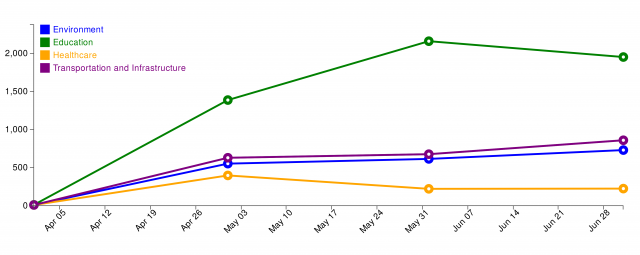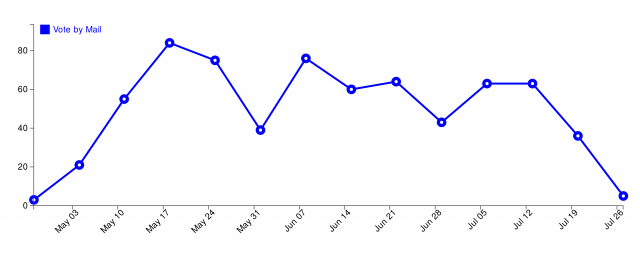Most federal lobbyists live in DC. When they wake up in the morning, they may brew some coffee and read the Washington Post. They may turn on the TV and watch CNN or Fox. When they get to work (or during coronavirus, walk from the kitchen to their desk), they may read a few morning newsletters. They likely then reference a trade publication relevant to their organization.
While these publications all do an exceptional job detailing what’s happening in Washington (and, in election years, on the campaign trail), they aren’t the only publications a legislator is reading before starting their day. They are also spending time reading their local newspapers, like the Boston Globe, the Pittsburgh Post Gazette, or the Richmond Times-Dispatch.
Reading the local coverage your organization’s issue is getting in a member’s district can go a long way in getting the member’s buy-in on your stance. Understanding the district’s newsworthy stories can help gain buy-in from the legislator because it shows you’ve done your homework and come prepared. More importantly, news monitoring can help personalize your pitch to a legislator if you take the following steps:
Learn the District Angle
While your issue may have a national objective, its implications may be unique to each state or district. For example, say you’re arguing for a national environmental plan. The impacts of policy changes to address climate change are distinctive based on the economic and geographic landscape of each district. With those factors, a legislator’s constituents may have perspectives on your issue that are informed by their region more so than their political ideology. By reading a legislator’s district news, you can learn the tone constituents use to discuss your issue, the stories they tell when talking about your issue, and the local implications they discuss when considering how they stand on an issue.
To do this, uncover the answers to questions like what vocabulary are reporters using to describe the issue in local publications and what kind of headlines the stories are getting? Consider a news monitoring software like Quorum that allows you to visualize a word cloud on the articles that mention your organization’s issues to do this at scale.
Once you understand the local angle of the issue, bring those local talking points into your pitch on why a legislator should act in a certain way. If there is local terminology that you see consistently across news articles, consider using it in conversations with that member.
Know How Important Your Issue Really is to that District
Once you’ve got a grasp of how a legislator’s district views your policy issues through its news stories, consider how many stories are appearing in local publications on your issue. The member’s constituents may whole-heartedly support your organization’s stance, but where does it stand in their list of policy areas that influence their decision making?
To understand where your issue stands on a district’s priority list through the news, first look at the top local papers and see their full collection of articles over a given period. Then, run a search amongst those publications for articles mentioning your issue to find the percentage of stories mentioning your issue. Then, do the same thing for other major policy areas appearing in the news and compare the volume of coverage.

See how your issue compares to other major issues to see where this priority lies with the legislator and their constituents.
Another way to do this is to observe trends in the volume of stories mentioning your issue. If the number of stories each month is steady over time, it may be harder to drive urgency with the legislator because it’s not driving action amongst their constituents. If there’s a significant spike in dialogue in a given district, you can use that data to convince the member to act expeditiously.

Look for spikes in dialogue on your issue to find ways to drive urgency with a legislator.
With this information, you can prioritize what kind of messaging to use with that member. If your issue is already a high-priority with the member’s district and represents a large portion of the news cycle, you can spend more time discussing the specifics. This would also be an excellent opportunity to make a more significant ask, such as sponsoring new legislation. If the issue is a lower priority, you should focus your time on issue education. Consider sharing data from your organization that may be new to the member on the impact the issue will have on their district that constituents may not know.
Give Legislators a Local Story
A frequent recommendation from legislators on making your message stand out is to share a local story. The local story helps the legislator a) remember your issue better due to its personalization and b) have stories to use in potential floor speeches and conversations with other legislators.
For organizations with a large national or international footprint where it is challenging to keep up with the news of every business location, quickly searching the local press for recent stories mentioning your organization can provide a personal touchpoint.
For example, Walmart keeps a report of every time it is mentioned in the news, such as when it opens a new store or makes a donation to a local organization. As soon as Senior Manager in Public Affairs Matt Fitz-Gerald learns of a press mention, he uses it to engage the representatives of that district.
“If someone on Ways and Means is looking at a tax reform bill that affects us, perhaps something around the Border Adjustment Tax, we want to make sure they understand that we support American-made products,” FitzGerald said. “Where there might be an event or an article about one of our suppliers in the district, we share a note with the legislator.”
News alert systems such as Google Alerts or Quorum News Monitoring ensure you never miss a mention of your organization — without having to scour every article on your own.
Understand the Local Players
In articles on your issue, are there local organizations or advocacy groups who are consistently part of the conversation? It’s likely the legislator you are meeting with is familiar with the local stakeholders on a given issue and that those stakeholders influence the voting behavior of the district’s constituents.
If you find organizations that align with you, draw the connection to show there is organized interest from the district on your stance. If you find organizations that oppose your position, come prepared with talking points that could assuage those groups’ concerns or share the groups that do align to show that the opposition group doesn’t speak for the whole district on your issue.
How to do it: If you’re fully unaware of the groups in the district, skim through articles mentioning your issue to see who reporters are quoting. If you are familiar with the local groups, use an alert system to track mentions of that organization to see how frequently they are getting their name in the press to gauge their level of influence.
Best Practice: Organize Newspaper Headlines in a Leave-Behind
How often do you read the daily newspaper cover to cover? Probably not that often. While legislators are likely reading their local publications frequently, don’t assume that they’ve read all the articles you have on your issue.
If you found a story about your organization referenced in a local paper, be sure to mention its publication so the legislator knows it was important enough for a reporter to take the time to cover it. Mentioning the press your organization and issue receive adds validation to your talking points, proving that what you are saying is relevant to local discourse.
To take it a step further and have a higher chance of that press coverage making an impact, include references to those press clips in a leave-behind to the member. When they go back to reference your conversation the next time your issue comes to the discussion table in a committee hearing or to a vote on the floor, they’ll remember the press evidence you shared in the meeting.
While your communications team spends their time working to keep your organization in the news, your team can take advantage of their hard work by using it to maximize your engagement with legislators. In addition to tracking legislator’s social media, newsletters to constituents, and press releases, news articles provide a unique tool in your research arsenal to go into each meeting equipped with your best talking points to move the needle on the issues your organization cares about.